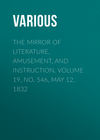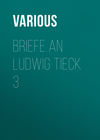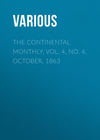Buch lesen: «The Mirror of Literature, Amusement, and Instruction. Volume 19, No. 546, May 12, 1832», Seite 4
REMARKABLE JAY
A lady residing at Blackheath has in her possession a fine Jay, which displays instinct allied to reason and reflection in no ordinary degree. This bird is stated by a Correspondent, (A.T.) to repeat distinctly any word that may be uttered before. She can identify persons after having once seen them, and been told their names; the latter she will pronounce with surprising clearness. She has a strong affection for a goldfinch in the same apartment, the latter bird appearing to return this fondness by fluttering its wings and other demonstrations of delight. The Jay has also been seen playing with two kittens, while the old cat looked composedly on at their gambols. This bird is in beautiful plumage, and is about twenty years of age. She is well known to the residents of Blackheath and its vicinity.
ENTOMOLOGY
I have lately observed a curious fact, which I have never seen noticed in any book which has fallen in my way, viz. that it is the tail of the caterpillar which becomes the head of the butterfly. I found it hard to believe till I had convinced myself of it in a number of instances. The caterpillar weaves its web from its mouth, finishes with the head downwards, and the head, with the six front legs, are thrown off from the chrysalis, and may be found dried up, but quite distinguishable, at the bottom of the web. The butterfly comes out at the top. Is this fact generally known?—Corresp. Mag. Nat. Hist.
THE RIVER TINTO
The river Tinto rises in Sierra Morena, and empties itself into the Mediterranean, near Huelva, having the name of Tinto given it from the tinge of its waters, which are as yellow as a topaz, hardening the sand and petrifying it in a most surprising manner. If a stone happen to fall in, and rest on another, they both become in a year's time perfectly united and conglutiated. This river withers all the plants on its banks, as well as the roots of trees, which it dyes of the same hue as its waters. No kind of verdure will flourish where it reaches, nor any fish live in its stream. It kills worms in cattle, when given them to drink; but in general no animals will drink out of the river, except goats, whose flesh, nevertheless, has an excellent flavour. These singular properties continue till other rivulets run into it, and alter its nature; for when it passes by Niebla, it is not different from other rivers. It falls into the Mediterranean six leagues lower down, at the town of Huelva, where it is two leagues broad, and admits of large vessels, which may come up the river as high as San Juan del Puerto, three leagues above Huelva.—From a Correspondent.
SPIRIT OF THE PUBLIC JOURNALS
THE GALLEY SLAVES
About a mile distant from one of the southern barriers of Paris, a palace was built during our Henry the Sixth's brief and precarious possession of French royalty, by the Bishop of Winchester. It was known by the name of Winchester, of which, however, the French kept continually clipping and changing the consonants, until the Anglo-Saxon Winchester dwindled into the French appellation of Bicêtre. The Bishop's old palace was treated as unceremoniously as his name, being burnt in some of the civil wars. But there is this advantage in a sumptuous edifice, that its very ruins suggest the thought and supply the means of rebuilding it. Bicêtre, accordingly, reared its head, and is now a straggling mass of building, containing a mad-house, a poor-house, an hospital, and a prison.
To see it is a matter of trifling difficulty, except on one particular day—that devoted to the rivetting of the chaine. A surgeon, however, belonging to the establishment, promised to procure me admission, and on receiving his summons, I started one forenoon for Bicêtre. Mortifying news awaited my arrival. The convicts had plotted a general insurrection and escape, which was to have taken place on the preceding night. It had been discovered in time, however, and such precautions taken, as completely prevented even the attempt. The chief of these precautions appeared in half a regiment of troops, that had bivouacked all night in the square adjoining the prison, and were still some lying, some loitering about. Strict orders had been issued, that no strangers should be admitted to witness the ceremony of rivetting; and the turnkeys and gaolers, in appearance not yet recovered from the alarm of the preceding evening, refused to listen to either bribe, menace, or solicitation. It was confoundedly vexatious. Whilst expostulating with the turnkey, I caught a glimpse through a barred window of the interior court, athwart which the chains lay extended, whilst in one railed off even from this the convicts were crowded, marching round and round—precaution forbade their remaining still—and uttering from time to time such yells and imprecations as might deafen and appal a Mohawk. "I have caught a glimpse at least," thought I, as we were unceremoniously turned out.
My friend, the surgeon, bade us, however, not despair. When the man of influence arrived he hoped to prevail; and in the mean time he led us to view the other curiosities of Bicêtre. There was the well, the kitchen, the anatomical theatre. The courts were crowded with aged paupers, who each well knew that his carcass would undergo what laceration the scalpel of my friend and his comrades chose to inflict upon it. But the thought seemed not to affect them so much as it did us. Methought the business of dissecting dead subjects might have been carried on more remote from the living candidates; but I was wrong, for mystery and secrecy always beget fear.
The mad-house was another curiosity. It contains many whose brain the revolution of July, 1830, had turned. One man, a fine youth, had travelled on foot from a distant part of the kingdom, to shed his blood as a sacrifice to the memory of Napoleon. He gave his last franc to obtain admission within the pillar of the Place Vendôme, and when there opened the veins of both his arms, crying out, "I offer the blood of the brave to the manes of Napoleon." His rolling black eye was now contrasted with a face pale as death. He had lost so much blood that few hopes were entertained of his recovery.
But by far the most curious patient of the mad-house, was a young man who imagined himself to be a woman. He was handsome, but not feminine in appearance. He adored a little mirror, with which he was gratified. Rags of all colours were his delight; and he had made a precious collection. His coquetry was evident; and he answered pertinently all questions, never belying at the same time his fixed opinion, that he was endowed with a maiden's charms.
We looked over the book of reports, and found seven-eighths of the female patients to have become deranged from love; whilst, with the majority of the males, the hallucination proceeded from disappointments of ambition. Surprised, I could make out no case of a religious maniac; glad, I could discover none of a student.
We now returned to machinations for the purpose of entering the forbidden prison. Aprons were handed us, not unlike a barber's. They were surgeons' aprons, always worn by those of the establishment when on duty. Might not then the barbers' aprons be a tradition of the barber-surgeons? I refrained from asking the question in that company. The scheme was, that we should pass for Carabins—such is the nickname of French students in chirurgery—and in this quality demand admission. The Cerberus of the prison grinned at the deceit, but wearied and amused by our importunities, he actually opened the quicket and admitted us. There are two grated doors of this kind, one always locked whilst the other is opened. In an instant we were in Pandemonium.
The buildings, which surrounded and formed the courts, evidently the oldest and strongest of Bicêtre, harmonized in dinginess with the scene. At every barred window, and these were numerous, about a dozen ruffianly heads were thrust together, to regard the chains of their companions.—What a study of physiognomy! The murderer's scowl was there, by the side of the laughing countenance of the vagabond, whose shouts and jokes formed a kind of tenor to the muttered imprecations of the other. Here and there was protruded the fine, open, high-fronted head,—pale, striking, features, and dark looks, of some felon of intellect and natural superiority; whilst by his side, ignominy looked stupidly and maliciously on. A handsome little fellow at one of the grates, was dressing his hair unconsciously with most agitated fingers, evidently affected by the scene. Our question of "What are you in for?" aroused him. "False signing a billet of twenty thousand francs," replied he, with a shrug and a smile. "And he, your neighbour?" asked we cautiously, concerning one of a fine, thoughtful, philosophic, and passionate countenance. "Ha! you may ask—he gave his mistress a potion, for the purpose of merely seducing her, and it turned out to be poison—a carabin like yourselves." But these made no part of the chaine.
The convicts destined for this operation were kept in movement round a post in an adjoining court, and were shouting, rarely in intelligible language, to their companions. Joy was the universal tone, and a sniveller ran imminent danger. One poor fellow I remarked holding down his head, when he was saluted with a kick from him who followed, and the objurgation, Tu es forçat, toi, heim?—"You a convict, and durst be sad." These men were all unmanacled. Methought a general rush on their part both practicable and formidable. One half must have perished, and the other half might have escaped.
They were now marched out from the inner court in batches of thirty at a time, drawn up in rank, stripped, and examined with such rigid scrutiny as I dare not precise. They were then marched and placed along one of the extended chains, and made to sit down, resting it in their laps. A square fetter was then fitted and placed around the neck of each. In this, before, some detached links from the chain were placed, whilst a huge smith proceeded to rivet each from behind. Fixing a kind of movable anvil behind the convict's back, the fetter that encircled his neck was brought with its joint upon it, and half a dozen blows of the sledge riveted the captive inextricably to the main chain and to his twenty-nine comrades. The smith must be adroit at his task, and the convict steady in his position; for, as the fetter is tight round the neck, the hammer, in its blow, must pass within a quarter of an inch of his skull, and a wince on his part might prove fatal. This, indeed, is the trying moment, when the stoutest cheek is blanched. The sturdiest frame, shaken by the blows of the sledge, then betrays emotion, and tears of penitence are at that moment almost always seen to fall. On sitting down, each had in general an air of bravado, produced in a great measure by the regards of the seemingly more hardened ruffians from the windows. Under the riveting there was no smile; whilst after it, apathy was affected or resumed, each endeavouring to make his iron collar as supportable and comfortable as possible, by enveloping it in a handkerchief, and guaranteeing the neck from its chill or galling.
When the chaine was completed, its wearers were made to stand up. They formed themselves in couples, the chain running betwixt two ranks, and they walked round the yard to take their first lesson in their galling exercise. They are thus fettered together till they reach Brest or Toulon. The choice is left to them of walking or being carried in carts, more provender being given to those who make the journey on foot.
The only part of their habiliments, which seemed left to themselves to provide, was a covering for the head, the red or green cap being given them only upon entering the bagne. For their journey, some of the fellows had provided themselves with strange head-gear, mostly made of straw; one had a three-cocked hat; others, one of all kinds of outré shapes. A prime vagabond had woven for himself a complete and magnificent tiara, precisely like the Roman Pontiff's in form, and surmounted by a cross. This was the Pope, the Pope of the Chaine, and I never heard a shout so appalling, as that with which his appearance was welcomed by the prisoners from the windows of the building. They danced, they yelled, tore and tumbled over each other in the most exuberant delight, thrusting their crowded heads and distorted features almost through the gratings. I have gleaned from it quite an idea of a scene of merriment and exultation below.
The said Pope was a very extraordinary fellow: a slight fair form, pointed features, and eyes that were penetrating, despite their common shade of grey. He was called Champenois, his real name unknown, not more than three-and-twenty, and the Lieutenant of the Chaine said, one of the most talented and extraordinary characters that he had ever met with. He had been the prime mover of the intended insurrection, but without a proof against him, except his universal authority, unusual in so young a thief. His physiognomy was one, which it required not a second look in order to remember for ever.
Another figure struck me, not so much as singular in itself, as in contrast with those around. It struck me as that of an English cabin-boy, a pale, freckled, ill-conditioned lad. On following the calling over of the register in roll, I found my conjecture too true. He was an unfortunate young sailor, a native of England, guilty of some misdemeanour, and by name Aikin. He understood not a word of French, but protested with a shake of his head against his being English; patriotism had in him outlived honesty and self-respect. I spoke to him in English: he wept, but would not reply, puckering up his poor lips in all the agony of his desolate condition. I was glad to remark the humanity with which he had been chained to a prisoner, pensive and downcast like himself.
There were some cases certainly hard; one or two for resisting the gen-d'armerie in a riot at Rouen. To transport a rioter, unless under aggravated circumstances, is grievous enough; but after the revolution of July, that hallowed riot, to make a galley-slave of a brave for resisting the police, must have been at least surprising to him. The tribunal no doubt felt the necessity of severity; and we acknowledged it all in deploring the degradation of these poor devils for an act, which in so many thousand others was, at the moment, extolled to the skies as the acmé of heroism. But justice hath her lottery-wheel as well as fortune.
As the last chaine was completing, an ecclesiastic went round to collect money of the visitors. But as there were few, so were the offerings. The convicts at the same time produced the fruits of their ingenuity in straw work-boxes, needle-cases, carved ivory and wood. The guardians, to do them justice, seemed humane.
The bagne at Toulon, the destination of the members of the chaine, was respectably peopled when I visited it some years ago. It contained amongst others, Sarrazin, a famous general, who had deserted to us from Buonaparte, and whose works on the Spanish and other campaigns, are still read with interest. The general had caught the inexcusable habit of marrying a wife in each town wherein he was quartered, and was sent to the gallies for trigintagamy. They boasted a bishop too amongst the convicts at Toulon, a merry little fellow, that bore his fate gaily, and who still contrived to exercise a kind of spiritual supremacy over his unfortunate comrades.
The ingenuity and hardihood of these men is surprising. Despite the vigilance, the ramparts, the fetters, and the logs, they escape hourly and daily;—at what risk is manifest from the regulations, by which three cannon shots always announce the disappearance of a convict, serving to warn the peasants, and call them to earn the handsome reward given to whoever arrests one of the branded fugitives. They are easily recognised by the halt in one limb; as they are wont to drag after them that which has been accustomed to the bullet.
The only pursuits that seem to pervade the bagne, are those of eating and dying: with the exception of escape, all others are denied. And those who have given up the latter hope, confine their thoughts either to bettering their meagre fare of beans, or to getting rid of existence in the most advantageous way. It is remarkable and degrading to observe the utmost human ingenuity and industry employed, in order to procure a dish of potatoes fried in grease once in the week. Yet such is the luxury of a forçat, and he must labour for it harder than even an Hibernian peasant, or a poet of the same line.




















